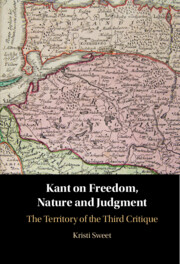Book contents
- Kant on Freedom, Nature, and Judgment
- Kant on Freedom, Nature, and Judgment
- Copyright page
- Dedication
- Epigraph
- Contents
- Acknowledgments
- Abbreviations
- Introduction
- 1 Reason, Hope, and Territory
- 2 Reflection, Purposiveness, Metaphysics
- 3 “Life” and the Ideal of Beauty
- 4 The Sensus Communis and the Ground of the Critical System
- 5 Genius, Aesthetic Ideas, and a Spiritualized Natural Order
- 6 The Domain of Nature as System: Ends
- 7 Hope and Faith: God in the Critique of Teleological Judgment
- Conclusion
- Bibliography
- Index
6 - The Domain of Nature as System: Ends
Published online by Cambridge University Press: 07 August 2023
- Kant on Freedom, Nature, and Judgment
- Kant on Freedom, Nature, and Judgment
- Copyright page
- Dedication
- Epigraph
- Contents
- Acknowledgments
- Abbreviations
- Introduction
- 1 Reason, Hope, and Territory
- 2 Reflection, Purposiveness, Metaphysics
- 3 “Life” and the Ideal of Beauty
- 4 The Sensus Communis and the Ground of the Critical System
- 5 Genius, Aesthetic Ideas, and a Spiritualized Natural Order
- 6 The Domain of Nature as System: Ends
- 7 Hope and Faith: God in the Critique of Teleological Judgment
- Conclusion
- Bibliography
- Index
Summary
Chapter 6 turns to the Critique of Teleological Judgment. It traces Kant’s remarkable line of argumentation from our encounters with living beings (organisms) to culture. Our encounters with living beings justify the use of teleology as a principle to organize our mechanistic inquiries into science. It further allows for us to judge nature, as a whole, as a system. This system, as we come to see, is oriented not only by human life, but specifically by the work nature can do to discharge human beings from its order. This chapter argues that if beautiful things remind us we belong in the world, there is a dialectical reversal in teleology suggesting that we do not belong to the natural order. This comes out in Kant’s discussions of culture and of the sublime, which are ways nature appears to discharge us from its influence. Nature thus supports our moral vocation by releasing us from its influence over us.
- Type
- Chapter
- Information
- Kant on Freedom, Nature, and JudgmentThe Territory of the Third <i>Critique</i>, pp. 157 - 181Publisher: Cambridge University PressPrint publication year: 2023

